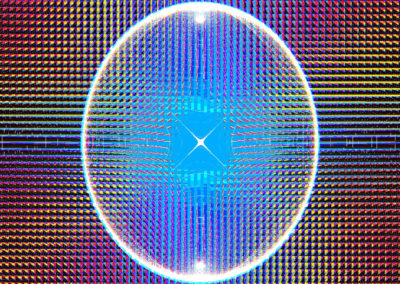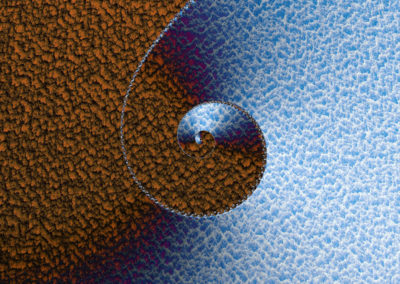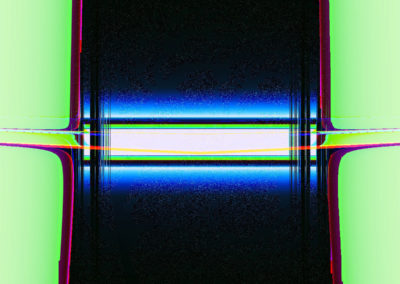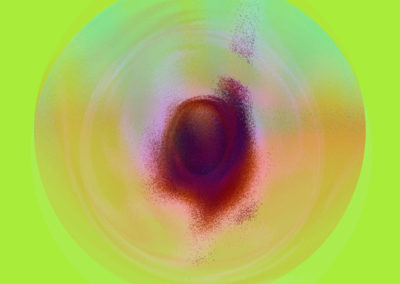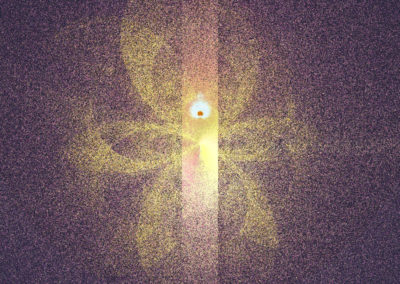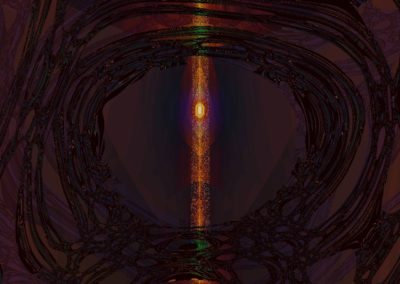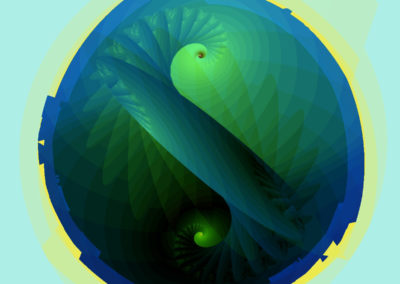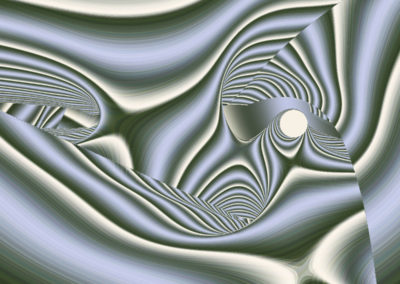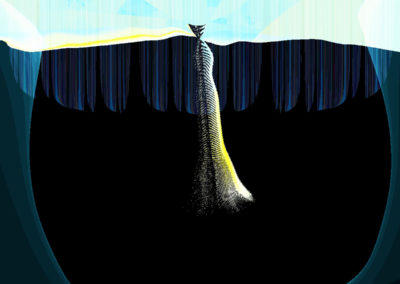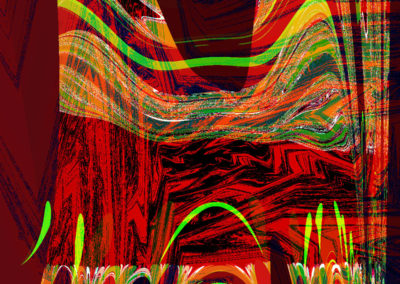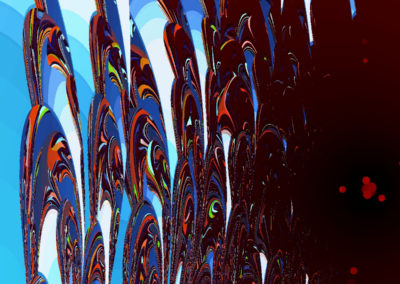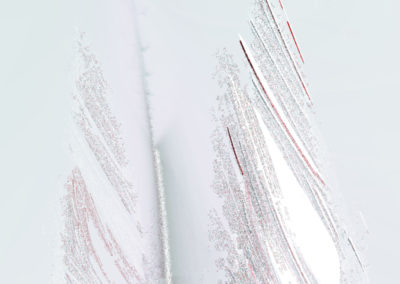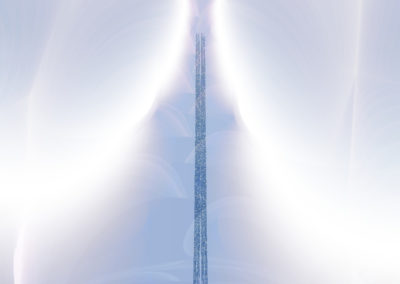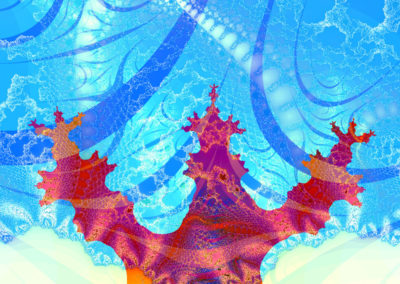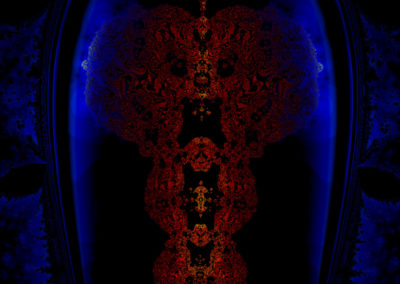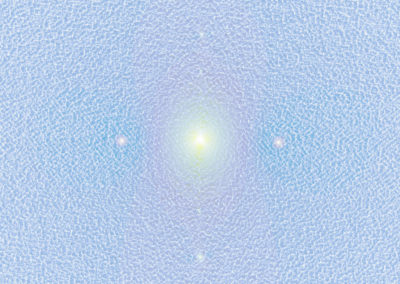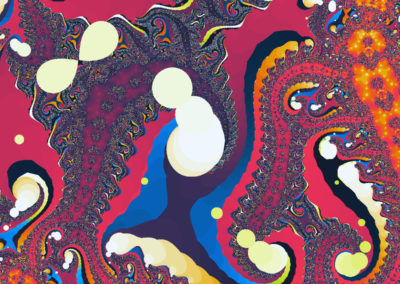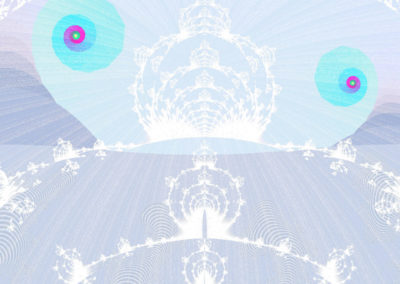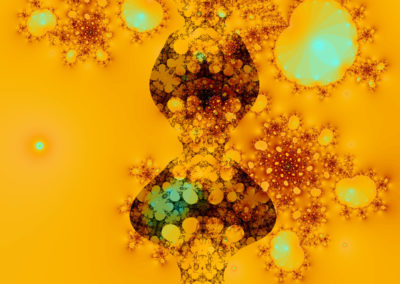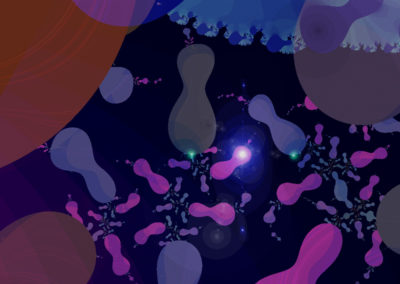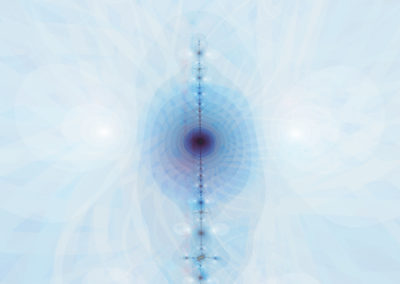Fractal 057 F – Human nature
Part of BEYOND series – 11 2023
fall . goodandevil . light . obscuration . obstacle . opposition . path . soul . spirituality
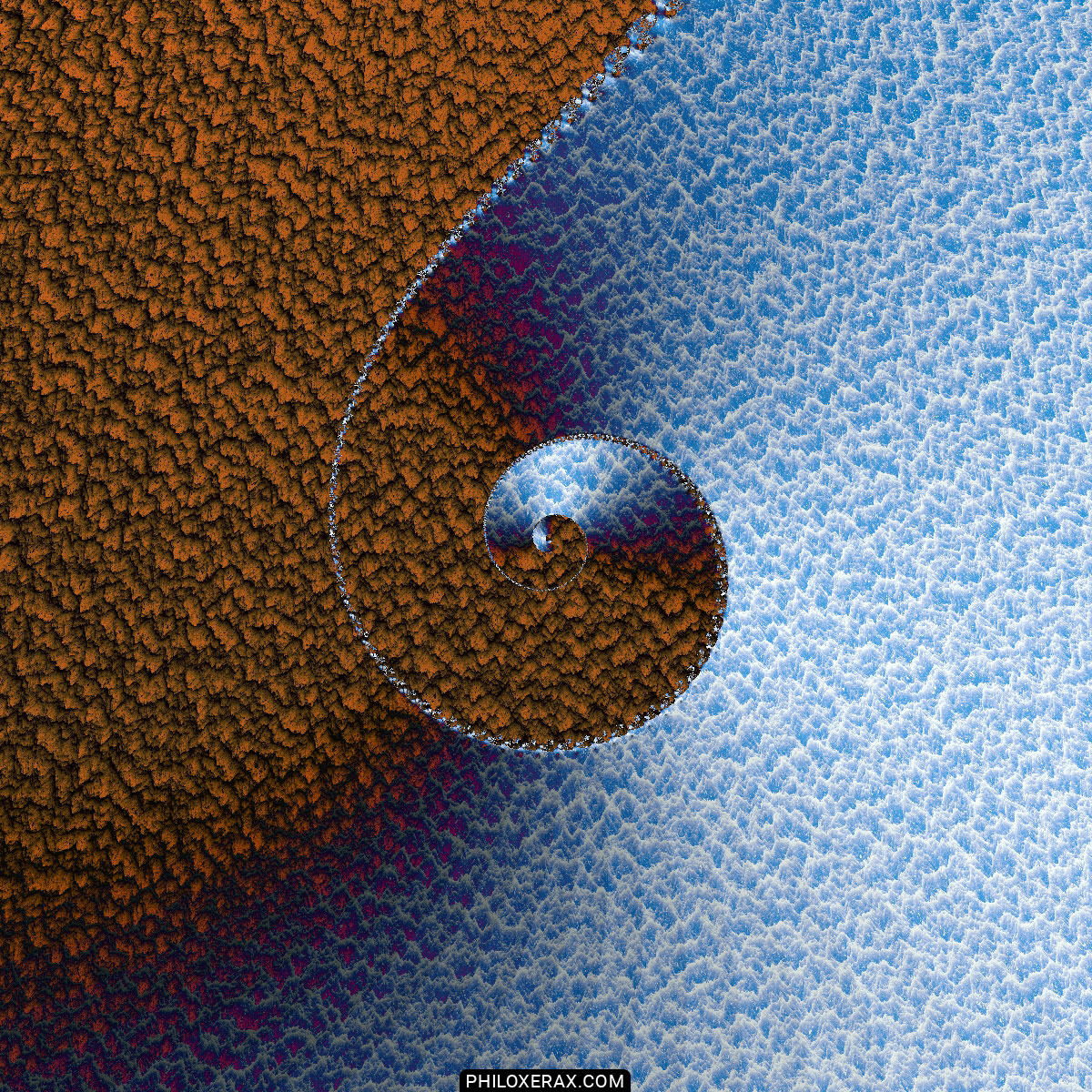
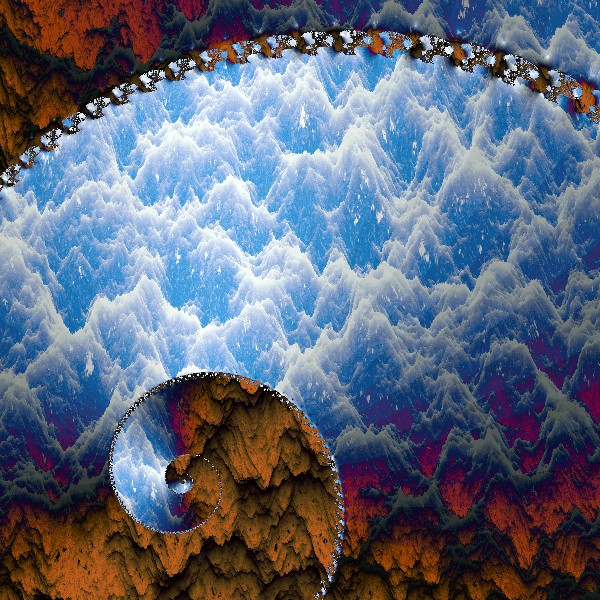
Fractal 057 F – zoom level 1
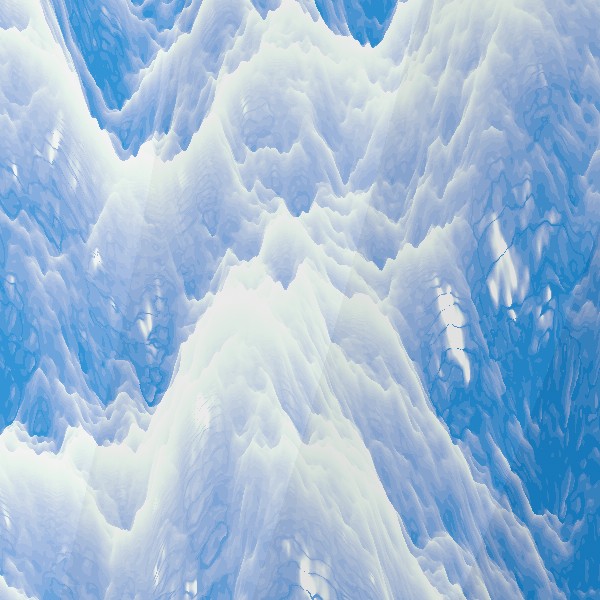
Fractal 057 F – zoom level 2
Data
This digital works is created exclusively from fractals, with 0% AI generated. It can therefore be converted into a set of functions and parameters that can be the basis for the training of an AI.
The mathematical formulas and parameter combinations corresponding to each fractal are presented below. In each case, the numerical characters have been replaced by ■ to prevent unauthorized reproduction. If you are interested in using the full data set to train an AI, please contact Philippe.
Fractal 057 F - Human nature - Part of BEYOND series - 11.2023
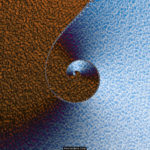
Fractal_■■■_F {
fractal:
title="Fractal_■■■_F" width=■■■■ height=■■■■ layers=■
credits="Philoxerax;■■/■■/■■■■" antialiasing=yes
layer:
caption="Background" opacity=■■■ mergemode=difference
mapping:
center=■■■.■■■■■■■■/■■■■.■■■■■■ magn=■.■■■■■■■ angle=-■■■.■■■■
formula:
maxiter=■■■■ percheck=off filename="mt.ufm"
entry="mt-newton-error-m" p_epsilon=■.■■■■■■■■■■■■■■■■■■■■■■■■■■
f_fn=asinh
inside:
transfer=none
outside:
transfer=linear
gradient:
comments="Simple grayscale gradient." smooth=yes rotation=■■
index=■■ color=■■■■■■■■ index=■■■ color=■ index=■■■ color=■■■■■■■■
opacity:
smooth=no index=■ opacity=■■■
layer:
caption="Background" opacity=■■■
mapping:
center=■.■■■■■■■■■/-■■.■■■■■■■■■ magn=■.■■■■■■■■ angle=■.■■■■
formula:
maxiter=■■■■ percheck=conservative filename="dmj.ufm"
entry="dmj-fBmNovaMandel" p_start=■/■ p_power=■/■ p_bailout=■.■■■■■
p_relax=■/■ p_distortion=■.■ p_style=radial p_distangle=■.■
p_distcenter=■/■ p_centermove=no p_offset=■/■ p_scale=■.■
p_angle=■.■ p_step=■.■ p_anglestep=■■.■ p_octaves=■ p_npower=■.■
p_noisestart=■.■ p_noiseiter=■■■■■.■ p_noiseskip=■.■ p_coloronly=no
inside:
transfer=none solid=■■■■■■■■■■
outside:
transfer=linear
gradient:
smooth=yes index=■ color=■■■■■■■ index=■■ color=■■■■■■■■ index=■■
color=■■■■■■■■ index=■■■ color=■■■■■■■■ index=■■■ color=■■■■■■■■
index=■■■ color=■■■■■■■■
opacity:
smooth=no index=■ opacity=■■■
}
dmj-fBmNovaMandel {
;
; This is the basic Nova (Mandelbrot) type, but with a
; bit of fBm noise added at each iteration. This
; tends to distort the fractal beyond all recognition
; after just a few iterations, which may or may not
; be what you're looking for.
;
; You can also use the "Coloring Only" option to
; restrict the fBm distortion to the value passed
; to the coloring algorithm; the distortion will be
; removed before the next iteration is calculated.
;
init:
complex zsquared = (■,■)
complex zcubed = (■,■)
complex zold = (■,■)
z = @start
complex oz = z
complex c = @distcenter
IF (@centermove)
c = #center
ENDIF
complex r = (■,■) ^ (@angle / ■■.■)
complex r■ = (■,■) ^ (@anglestep / ■■.■)
complex r■ = (■,■) ^ (@distangle / ■■.■)
float fiter = @noisestart
BOOL noise = false
loop:
IF (@noiseskip != ■); we are skipping some iterations
fiter = fiter - ■; one less to go before we add noise
WHILE (fiter < ■.■); iterations all used up
IF (noise); we are currently adding noise
noise = false; so stop
fiter = fiter + @noiseskip; skip this many iterations
ELSE; we aren't currently adding noise
noise = true; so start
fiter = fiter + @noiseiter; do this many iterations
ENDIF
ENDWHILE
ENDIF
IF (@coloronly); only using fBm on coloring
z = oz; restore z from un-fBm'ed copy
ENDIF
IF (@power == (■,■)); special optimized routine for power ■
zsquared = sqr(z)
zcubed = zsquared ■ z
zold = z
z = z - @relax ■ (zcubed-■) / (■■zsquared) + #pixel
ELSE
zold = z
z = z - @relax ■ (z^@power-■) / (@power ■ z^(@power-■)) + #pixel
ENDIF
IF (@coloronly); only using fBm on coloring
oz = z
ENDIF
IF (@noiseskip == ■.■ || noise); adding noise this iteration
complex p = z ■ @scale ■ r ;+ @offset
float sum = ■.■
float freq = ■.■
complex v = (■,■)
int i = @octaves
WHILE (i > ■)
; determine integer coordinate for corners of square
; surrounding p
float bx■ = floor(real(p)) % ■■■
float by■ = floor(imag(p)) % ■■■
IF (bx■ < ■)
bx■ = bx■ + ■■■
ENDIF
IF (by■ < ■)
by■ = by■ + ■■■
ENDIF
float bx■ = (bx■ + ■) % ■■■
float by■ = (by■ + ■) % ■■■
float rx■ = real(p) - floor(real(p))
float ry■ = imag(p) - floor(imag(p))
float rx■ = rx■ - ■
float ry■ = ry■ - ■
; create a "random" index for each corner
; (this is where Intel's version differs from Perlin's;
; I used Intel's version because it doesn't require a
; pre-computed random table, which is difficult to manage
; in UF.)
float b■■ = (bx■^@npower % ■■■■■ + by■)^@npower % ■■■■■
float b■■ = (bx■^@npower % ■■■■■ + by■)^@npower % ■■■■■
float b■■ = (bx■^@npower % ■■■■■ + by■)^@npower % ■■■■■
float b■■ = (bx■^@npower % ■■■■■ + by■)^@npower % ■■■■■
; produce a "random" vector for each corner
float g_b■■_■ = (b■■)^@npower■■.■■ % ■■■ - ■■■
float g_b■■_■ = (b■■)^@npower■■.■■ % ■■■ - ■■■
float g_b■■_■ = (b■■)^@npower■■.■■ % ■■■ - ■■■
float g_b■■_■ = (b■■)^@npower■■.■■ % ■■■ - ■■■
float g_b■■_■ = (b■■+■)^@npower■■.■■ % ■■■ - ■■■
float g_b■■_■ = (b■■+■)^@npower■■.■■ % ■■■ - ■■■
float g_b■■_■ = (b■■+■)^@npower■■.■■ % ■■■ - ■■■
float g_b■■_■ = (b■■+■)^@npower■■.■■ % ■■■ - ■■■
; normalize each vector
float d = ■.■;
d = ■ / sqrt(sqr(g_b■■_■) + sqr(g_b■■_■))
g_b■■_■ = g_b■■_■ ■ d
g_b■■_■ = g_b■■_■ ■ d
d = ■ / sqrt(sqr(g_b■■_■) + sqr(g_b■■_■))
g_b■■_■ = g_b■■_■ ■ d
g_b■■_■ = g_b■■_■ ■ d
d = ■ / sqrt(sqr(g_b■■_■) + sqr(g_b■■_■))
g_b■■_■ = g_b■■_■ ■ d
g_b■■_■ = g_b■■_■ ■ d
d = ■ / sqrt(sqr(g_b■■_■) + sqr(g_b■■_■))
g_b■■_■ = g_b■■_■ ■ d
g_b■■_■ = g_b■■_■ ■ d
; produce colors for each corner
float u■ = rx■ ■ g_b■■_■ + ry■ ■ g_b■■_■
float v■ = rx■ ■ g_b■■_■ + ry■ ■ g_b■■_■
float u■ = rx■ ■ g_b■■_■ + ry■ ■ g_b■■_■
float v■ = rx■ ■ g_b■■_■ + ry■ ■ g_b■■_■
; interpolate between corners using
; bilinear filtering
float sx = sqr(rx■) ■ (■ - rx■■■)
float sy = sqr(ry■) ■ (■ - ry■■■)
float a = u■ + sx■(v■-u■)
float b = u■ + sx■(v■-u■)
sum = sum + (a + sy■(b-a))■freq
freq = freq ■ @step
p = p ■ r■ / @step
i = i - ■
ENDWHILE
IF (@style == ■); radial distortion
v = (z-c)/cabs(z-c) ■ r■; use vector based on angle to distortion center
ELSEIF (@style == ■); linear distortion
v = r■; just use rotation vector
ENDIF
z = z + v ■ sum■■.■■@distortion
ENDIF
IF (@coloronly == false); not just using fBm on coloring
oz = z; value for bailout is fBm'ed z
ENDIF
bailout:
|oz - zold| > @bailout
default:
title = "Nova (Mandelbrot) + fBm"
helpfile = "dmj-pub\dmj-pub-uf-nf.htm"
maxiter = ■■■■
periodicity = ■
center = (-■.■,■)
magn = ■.■
param start
caption = "Start Value"
default = (■,■)
hint = "Starting value for each point. You can use this to \
'perturb' the fractal."
endparam
param power
caption = "Exponent"
default = (■,■)
hint = "Overall exponent for the equation. (■,■) gives \
the classic NovaM type."
endparam
param bailout
caption = "Bailout"
default = ■.■■■■■
hint = "Bailout value; smaller values will cause more \
iterations to be done for each point."
endparam
param relax
caption = "Relaxation"
default = (■,■)
hint = "This can be used to slow down the convergence of \
the formula."
endparam
param distortion
caption = "Distortion Strength"
default = ■.■
hint = "This is the amount the noise distorts the image."
endparam
param style
caption = "Distortion Style"
default = ■
enum = "radial" "linear"
hint = "This selects whether the distortion will be focused \
around a single point, or directed along a line."
endparam
param distangle
caption = "Distortion Angle"
default = ■.■
hint = "This is the angle to rotate the distortion."
endparam
param distcenter
caption = "Distortion Center"
default = (■,■)
hint = "Sets the center of distortion. If Use Screen \
Center is set, this item is ignored."
endparam
param centermove
caption = "Use Screen Center"
default = FALSE
hint = "If set, distortion will be around the center of \
the window, regardless of the Distortion Center \
setting."
endparam
param offset
caption = "Noise Offset"
default = (■,■)
hint = "This is the offset of the pattern. You can use this to shift \
the pattern around on the complex plane."
endparam
param scale
caption = "Noise Scale"
default = ■.■
hint = "This is the overall scale of the noise."
endparam
param angle
caption = "Noise Rotation"
default = ■.■
hint = "This is the angle, in degrees, of the noise."
endparam
param step
caption = "Noise Scale Step"
default = ■.■
hint = "This is the step in scale between noise iterations."
endparam
param anglestep
caption = "Noise Rotation Step"
default = ■■.■
hint = "This is the angle, in degrees, to rotate between noise \
iterations."
endparam
param octaves
caption = "Noise Octaves"
default = ■
min = ■
hint = "This is the number of iterations of the noise formula."
endparam
param npower
caption = "Noise Exponent"
default = ■.■
hint = "This is the exponent used to scramble numbers."
endparam
param noisestart
caption = "Start Iteration"
default = ■.■
hint = "This is the iteration at which to start adding noise."
endparam
param noiseiter
caption = "Noise Iterations"
default = ■■■■■.■
hint = "This is the number of iterations to add noise to."
endparam
param noiseskip
caption = "Skip Iterations"
default = ■.■
hint = "This is the number of iterations to skip adding noise \
before starting again."
endparam
param coloronly
caption = "Coloring Only"
default = false
hint = "If set, noise will only apply to pixel values passed \
to the coloring algorithm; it will not be included in \
the fractal calculation between iterations."
endparam
switch:
type = "dmj-fBmNovaJulia"
seed = #pixel
power = @power
bailout = @bailout
relax = @relax
distortion = @distortion
style = @style
distangle = @distangle
distcenter = @distcenter
centermove = @centermove
offset = @offset
scale = @scale
angle = @angle
step = @step
anglestep = @anglestep
octaves = @octaves
npower = @npower
noisestart = @noisestart
noiseiter = @noiseiter
noiseskip = @noiseskip
coloronly = @coloronly
}
mt-newton-error-m { ; Mark Townsend, ■ Mar ■■■■
;
; This formula is the result of an error while
; trying to implement Newton's method for
; z+(z■c-■)^■
;
init:
z = @fn(■ - #pixel)
c = #pixel
float h = ■.■■■■
fz = fzd = oldz = ■
loop:
oldz = z
fz = z + (z ■ c - ■)^■
fzd = ■ / h ■ (z + ((z + h) ■ c - ■)^■ - fz)
z = z - fz / fzd
bailout:
|z - oldz| > @epsilon
default:
title = "Newton Error"
maxiter = ■■■■
periodicity = ■
param epsilon
caption = "Epsilon"
default = ■e-■
hint = "This is the bailout value."
endparam
func fn
caption = "Transform"
default = sqr()
hint = "This determines the starting point for z."
endfunc
switch:
type = "mt-newton-error-j"
c = #pixel
epsilon = epsilon
}
